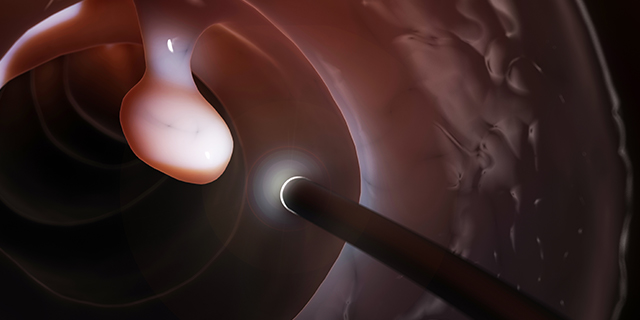During a colonoscopy test, your doctor examines the inner lining of the rectum and colon using a thin flexible tube called a colonoscope. This instrument is inserted into the colon through the rectum. A small camera mounted to the end of the colonoscope takes pictures, allowing the doctor to look for abnormalities, including polyps and areas of inflammation.
Air or carbon dioxide may be injected into the colon so your doctor can better see the surfaces. In most cases, the doctor will remove any polyps that are found during the procedure. If other abnormalities are found, your provider may take a tissue sample (biopsy).
Although many polyps are benign (not cancerous), some may be precancerous. Removing precancerous polyps during a colonoscopy can prevent colon cancer from developing. All polyps are tested in a lab to rule out or confirm cancer.
Before you schedule your colonoscopy, inform the doctor about any medications you take. You may be asked to stop taking some medications for up to one week before the procedure.
Proper colonoscopy preparation is very important for a successful test. The colon must be empty and clean so that the walls are visible during the procedure. The cleansing is done with prescription laxatives provided by your doctor. You should also eat simple, easily digested foods in the week before the colonoscopy.
It’s very important to take all of the laxatives prescribed to achieve a complete cleanse. Otherwise, the test may need to be repeated. Here are some tips to make it easier:
- The laxatives will cause loose, frequent bowel movements and watery diarrhea, so stay close to a bathroom.
- Don’t plan any outings on preparation day – instead, pamper yourself. Watch movies, read and nap.
- Keep drinking clear liquids to avoid becoming dehydrated.
- If you’re prescribed liquid laxatives, bypass your taste buds by drinking the solution through a straw.
Learn More About Prep for a Colonoscopy
A colonoscopy typically takes 30 to 45 minutes. However, plan on spending 2 to 3 hours at the hospital to account for preparation, waiting and recovery time.
Before the colonoscopy, you’ll be administered IV sedation. Most people have no memory of the procedure. After the procedure, you’ll be taken into a room to be monitored while the sedative wears off. Recovery time ranges from 30 to 90 minutes. Once your blood pressure, pulse and breathing are stable, and you are awake and alert, you will be discharged.
A family member or friend will need to drive you to and from your appointment. Once home, you may resume eating, starting with small amounts of food until your bowel returns to normal. Avoid drinking alcohol for at least 24 hours. Your care team may ask you drink extra fluids to make up for the water you lost during you procedure preparation.
It is normal to pass gas and feel minor abdominal discomfort after your procedure. Walking and moving around may help to ease any symptoms. Avoid any significant activities, including operating a vehicle and making any important decisions, until the day after your procedure.
Your initial colonoscopy results will be discussed with you after the procedure, including the quality of the preparation and whether any polyps were found. Poor bowel preparation or an incomplete exam will require repeating the procedure.
If no polyps or suspicious areas are found during the procedure, your next colonoscopy screening may not be needed for 10 years. If polyps were found and removed during the colonoscopy screening, they will be sent to a lab for testing. Biopsy results are typically available from your physician within 10 days of the procedure.
If the polyps are found to be noncancerous or precancerous, your doctor will determine your colonoscopy screening schedule. This schedule is based on the number of polyps, their characteristics, your risk factors and your family history. It may be recommended that you repeat colonoscopy screening in three to five years.
If the polyps are found to be cancerous, laboratory tests will determine the stage of the cancer. Your treatment options will depend on your diagnosis. When colon cancer is detected early, it has a 90 percent survival rate.
Colonoscopy is considered the gold standard for colon cancer screening. However, other screening tests are available for people for who are unable to have a colonoscopy due to higher risk of complications or other reasons.
Learn More



